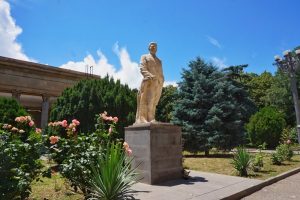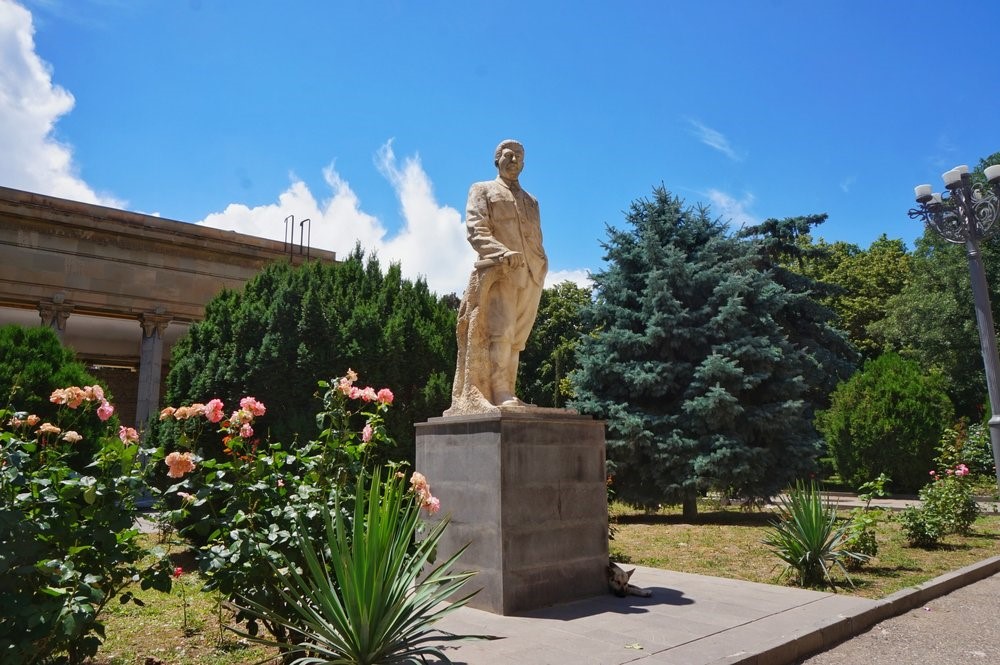By Courtney Kayser, September 19, 2018

Statue of Joseph Stalin in front of his enshrined childhood home in Gori, Georgia
1991 was heralded as the victory of Capitalism over Communism, the triumph of the West over the USSR, but within the former republics, opinions of the Soviet Union and communism are more mixed. The continued economic troubles and demographic strain exacerbate the dissonance within the former republics between celebrating their independence and desiring a return to the stability found in the Soviet Union and communist system.
In Georgia, for instance, their GDP dropped from 7.74 billion in US Dollars to zero, only recovering to 2.69 billion in 1993. Georgian GDP remained in the 2 to 4 billion USD until 2004, at which point its growth rate increased. The 2008 Russo-Georgian War, however, resulted in an economic recession that Georgia only began recovering from in 2011. In 2017, GDP reached 15.16 billion USD, and GDP per capita was 4290.17 USD. Yet, in the same year, only one percent of respondents to the Caucasus Research Resource Center’s Caucasus Barometer Survey reported an household income over 1200 USD per month, and no one outside of Tbilisi reported an income of this level. Almost 60 percent of respondents, however, reported a household income between zero and 250 USD per month. Between urban and rural areas, 42 percent of respondents were in the lowest four income categories in Tbilisi, 54 percent in urban areas, and 73 percent in rural areas.
Demographics in Georgia also raise concerns: the overall population is declining, but its urban populations are growing; its urban population grew by five percent between 2002 and 2014. Tbilisi’s population alone grew by 2.5 percent, but the population declined between 10 and 40 percent in the same timeframe in every other region of the country. Also in 2014, nearly 30 percent of Georgia’s population resided in the capital city. By comparison, if a single city in the United States were to contain a similar portion of the country’s population, it would have over 97 million residents, over eleven times the present size of New York City, and would be the largest city in the world. Though Georgia’s population is much smaller than that of the United States, this concentration of people generates strain: public transportation systems degrade faster, it is difficult to find employment, housing prices skyrocket – if there is available housing to be found.
This is not to say that moves are not being made to respond to population movements. Numerous building projects are underway, both on the outskirts of Tbilisi and within the city center. However, there are still only two metro lines to service the city, neither of which reach the majority of the housing areas. Bus commutes can take upwards of two hours into the city, but bus timetables are notorious in Tbilisi for not being accurate. Jokingly, residents refer to buses running on “GMT,” or “Georgian Maybe Time.” Still, many Georgians feel a sense of nostalgia for the Soviet period, as then, people had steady employment and the ability to afford necessities. They do not desire the return of a repressive government or the loss of their independence, but they do desire a return for the certainty they had under communism.
In addition to economic and demographic challenges, Georgia faces several security concerns it did not face as a union republic in the Soviet Union. There are nearly 300,000 Internally Displaced Persons (IDPs) within Georgia, mostly from Abkhazia and South Ossetia. These IDPs have a noticeable impact on everyday life – from the presence of refugee settlements to the fact that no university in Tbilisi has any dormitory space, as all of the buildings meant for this are presently being used to house IDPs. Twenty percent of Georgian territory is nominally controlled by the Russian Federation, but the Russian Federation is still one of Georgia’s largest trading partners. The Georgian government does not have the capacity to settle its own IDPs within cities, much less the military capabilities to retake South Ossetia and Abkhazia or to expel Russian forces from its territory. Georgia is precluded from joining NATO and faces limitations with accession to the EU due to these challenges to its territorial integrity and its ongoing conflicts.
Reliance on Russian markets limits Georgian policies, as the Georgian economy will suffer if the Russian Federation imposes sanctions or embargos, as they did after the Russo-Georgian War. EU and Turkish markets have potential, but taking advantage of these markets is reliant on Georgia’s ability to offset its own demographic and security concerns. In return, to alleviate these concerns, the Georgian government needs to fund its military and commit to expansive building projects, which in turn requires the government to tax its population – and the population needs to be making a decent income for these taxes to accumulate sufficient funds.
These features – economics, demographics, and security – are all interrelated. Resolving the challenges faced by the Georgian government will be a complex, long process. In the meantime, Georgia remains stuck between looking forward to a future with Europe and looking back to a past with Russia and the Soviet Union. Present insecurity and economic uncertainty about the future translates to a desire for the stability of the past, even if this stability is the product of rose-colored glasses.
Courtney Kayser is a Ph.D. student in Political Science at George Mason University’s Schar School of Policy and Government. She graduated Summa Cum Laude with a Bachelor’s degree in Political Science and Philosophy, a Certificate in Russian and East European Studies, and a minor in Russian language from Seton Hall University. She is proficient in Russian and French, and has an elementary proficiency in Ukrainian. Her research focuses on secession and nationalism in post-Soviet space.
Disclaimer
The articles and other content which appear on the Center for Security Policy Studies website and social media posts are unofficial expressions of opinion. The views expressed are those of the authors and do not reflect the positions of the Schar School of Policy and Government or of George Mason University.
The Center for Security Policy Studies does not screen articles to fit a particular editorial agenda, nor endorse or advocate material that is published. The Center for Security Policy Studies merely provides a forum for scholars and professionals to share perspectives and cultivate ideas. Comments on any digital outlet of the Center for Security Policy Studies will be moderated to ensure logical, professional, and courteous application of intellectual content.




